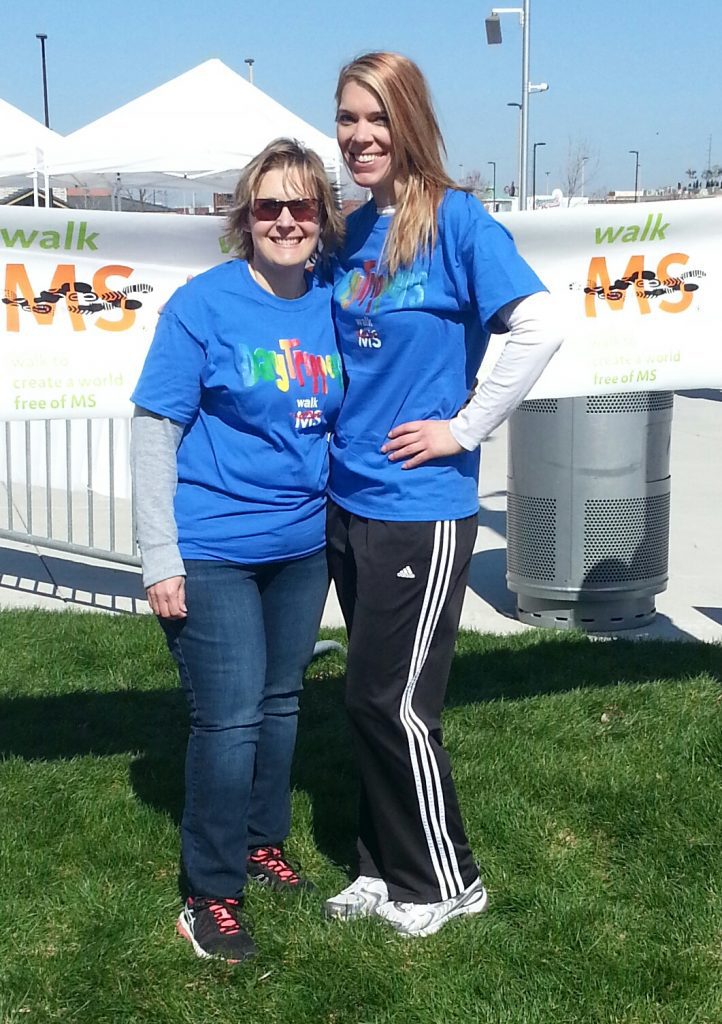When my cousin Michelle (born and raised in Kansas City) was in her 20s, she had her first child, which is life-changing on its own. But around that time, she started to feel like she was looking through a screen door with her left eye. By 29, parts of her body were going numb. An MRI and lumbar puncture confirmed shocking news—she had multiple sclerosis (MS).
May 30th is World MS Day, a day designed to bring the global MS community together to share stories, raise awareness, and campaign with everyone affected by multiple sclerosis…which is a lot of people. According to NationalMSSociety.org, nearly 1 million people are living with MS in the United States.

Why my cousin? Well, she’s a woman. MS is at least two to three times more common in women than in men. Also, she’s Caucasian. Research has demonstrated that MS occurs in most ethnic groups, including African-Americans, Asians, and Hispanics/Latinos, but is most common among Caucasians of northern European ancestry.
What does an MS diagnosis feel like to a new mom? I asked what her first reaction was, and she said, “What the heck is MS and what does it mean for me? I was given a pamphlet and told to take a prescription (shots in my torso, arms, and legs), and I decided I would never be in a wheelchair….I never have been!”
I remember going to a concert with Michelle a few years ago. After the show, there were some stairs as we left our seats, and she had to keep a hand on the wall to steady herself, and she wobbled a bit with each step. A man (probably in his 40s) laughed and said, “Wow, how much did YOU drink?” It took everything I had not to yell, “SHE HAS MS YOU *$&*!” But the truth is, most people DON’T know what MS looks like. It doesn’t show itself like more obvious diseases. It looks like fatigue, bad balance, and poor coordination…which, yes, can simply look drunk. As Michelle says, “Even if I look fine on the outside, my body is going haywire on the inside.”
What’s actually happening in a person with MS is that an unpredictable, often disabling disease of the central nervous system is disrupting the flow of information within the brain and between the brain and body. Michelle says, “It won’t kill you, but some days, you might want to die.”
So, how can we be supportive of someone with MS? She says, “Just let them know they are significant. Don’t treat them differently than before their diagnosis. If they aren’t able to do something, they need to decline. Don’t overwhelm them either. Shopping all day or partying all night used to be a blast. Now forget starting with breakfast because we won’t be out of our pajamas ‘til noon and IF we get out of them, back in them by 7 p.m.”
When I asked Michelle what she’s learned from MS, she said, “It is important to be your own advocate in your healthcare and your rights as a person with a disability. No one has the enthusiasm and passion that YOU do, and that’s what others need to feel in order to understand.”
And perhaps something that we can all recognize, “There is always someone who is having a worse day than me. I’m pretty darn lucky.”

















Thank you for sharing my story. I am truly blessed because there are so many MS patients much worse off. I remind myself of that on my bad days. It is imperative to have a strong support system of family and friends. Often, we lose friends and family who just don’t understand why we decline invitations because they don’t understand how the disease affects us. “We were just fine yesterday.” That could have been a good day, or we used all of our energy to look good when you saw us. I always tell my kids that I’m only good for so many steps, after that I’m done. Additionally, MS affects every person differently and different things trigger each individual, then their response to that is not the same as anyone else’s. It is truly a snowflake disease, and that is what makes it so difficult to find a cure.
I love 💗 you so much and am so proud of you. You are so articulate in telling your life experience.